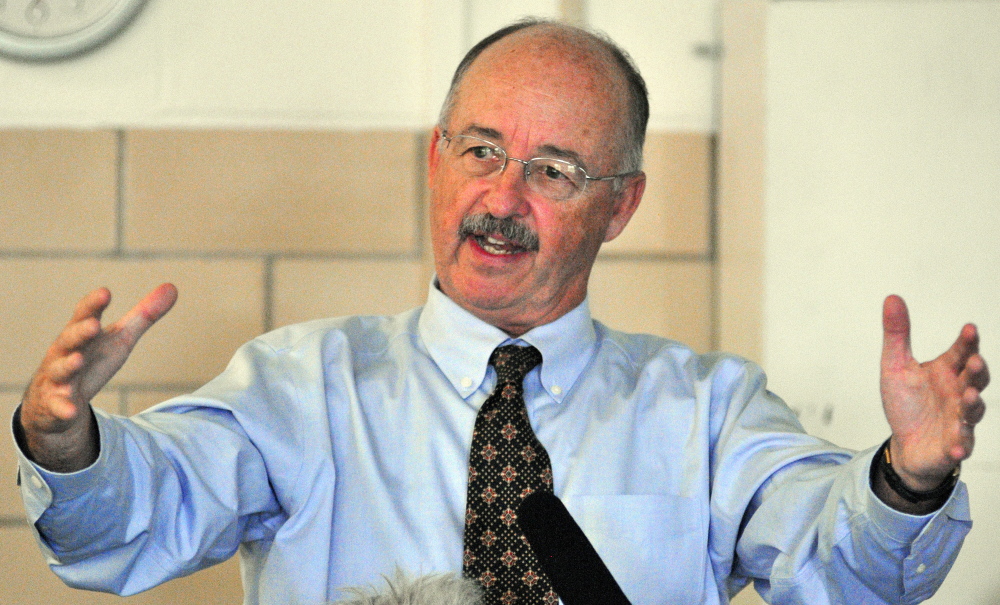AUGUSTA — A $125,000 federal grant awarded to the Augusta Police Department will be used to help create a new police officer position dedicated to drug abuse education and prevention in the city’s elementary schools.
Chief Robert Gregoire said the new position will be similar to the role filled now at Cony High School by School Resource Officer Carly Wiggin. The new position will be focused on the city’s younger students at elementary schools and in summer recreation and childcare programs.
Gregoire said even students as young as those in elementary school aren’t immune to societal problems, including the ongoing heroin and other opioid drug addiction epidemic.
“Elementary schools are a reflection of what is going on in the community,” Gregoire said. “Look at what is going on across the country. You’ve got people (robbing) stores with their children, people overdosing in their cars with children there. People have children and they still do drugs. Augusta is not immune to that.”
The grant will fund 75 percent of an entry level officer’s salary for three years, capped at $125,000, with the city required to keep the officer on for a fourth year at local expense.
City Manager William Bridgeo estimated the city’s required share of the officer’s salary and benefits will be about $137,000 over the three years of partial federal funding and one year of all local funding.
Gregoire said having Wiggin as a school resource officer has been valuable, cutting the number of times patrol officers have to respond to Cony. By establishing relationships with students, Wiggin helps prevent and deter crimes by students, he said.
But he said while Wiggin spends at least a little time in the city’s four elementary schools, she’s so busy at Cony with middle and high school students she hasn’t had time to be in the elementary schools consistently and wouldn’t have time to take on the new educational programming proposed.
“There are about 2,200 kids in the school system. You’re talking a huge number of children. No one officer can deal with all that,” Gregoire said. “Especially if you want to spend some time building valuable relationships with children in the community.”
Gregoire said an experienced police officer will be selected for the work, and a new entry level officer will be hired, in part with the grant funds, to take that officer’s place patrolling city streets. He said the hiring process is underway now. He noted whichever officer is selected for the work, he or she will undergo nationally-recognized training before starting in the schools.
“You want someone who has experience, who has built relationships in the community, who we know can do this job and do it well,” Gregoire said of the ideal officer for the task. “It takes the right person. We’ll involve the school in the decision-making process.”
He said the officer will teach elementary students based on the Drug Abuse Resistance Education, or DARE, program.
Jared Mills, deputy police chief, said he and Gregoire conducted a national search for an effective, standardized anti-drug curriculum they could bring to the city’s schools and DARE was the only one they found. They said the DARE program was revamped in 2011 after doubts were expressed nationwide about its effectiveness. They said statistics have shown children having positive interactions with a police officer when they are young pays dividends in both avoiding drug abuse and in gaining skills that will help them deal with other problems in children’s lives.
Gregoire said the DARE program is not just about drugs, but also includes lessons about bullying, high risk behavior and social media, and seeks to build children’s decision-making skills. The officer will use DARE’s “Keepin’ it REAL” program, an acronym for Refuse, Explain, Avoid and Leave.
In the summer months, when school is not in session, the officer will seek to maintain contact with local youths, such as by partnering with Augusta Recreation, interacting with kids at city parks and pools, and at summer programs at Buker Community Center.
City councilors initially authorized applying for the grant in late April.
Then, in June, councilors reaffirmed their previous vote after administrators came back to them after they learned participating in the federal program would likely cost the city more than previously anticipated.
On the second vote, councilors voted 5-2 to reaffirm their previous commitment.
“The cost of not funding this, in my estimation, is going to be greater than the cost if we do,” Mayor David Rollins said at the time. “If we lose another generation, if we don’t reach out and get them connected to the positive side of life at a young age, we can’t get them back when they’re in middle school and high school and they’re hooked and it’s a disease.”
The federal Department of Justice awarded a total of $625,000 in Office of Community Oriented Policing Services, or COPS, funding to Maine municipalities. The Biddeford Police Department will receive $250,000, while departments in Augusta, Ellsworth and Westbrook will each receive $125,000, according to news releases from the offices of U.S. Rep. Chellie Pingree and U.S. Sens Susan Collins and Angus King.
“Communities across Maine rely on local law enforcement to help keep them safe, and federal investments can play an important role in assisting those community efforts,” Collins and King said in a joint news release. “This grant funding will support local police departments as they work to protect families and promote public safety.”
Last year the city hired two new detectives to combat drug dealing and drug-related crimes in the city. And for the second year in a row, city councilors in February set as a major goal fighting the growing opiate and heroin abuse epidemic.
Gregoire said he believes the new position will help make a positive difference.
“Kids are seeing challenges today we weren’t seeing 20 years ago, or even 10 years ago,” he said. “Providing kids with information to help them deal with the issues they’re facing today could be of great help to them.”
Keith Edwards — 621-5647
Twitter: @kedwardskj
Send questions/comments to the editors.




